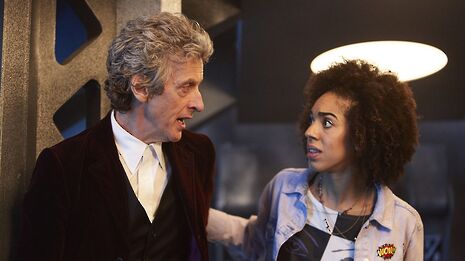Review: Doctor Who Series 10 Premiere
After two abysmal series, Lillian Crawford has high hopes for Steven Moffat’s final year as head writer after a promising premiere

Since its regeneration in 2005, Doctor Who has undergone a similar pattern to its ‘classic’ series. Eccleston mirrored Hartnell’s loveable moodiness, which carried through to Baker and Tennant, growing brilliantly dark towards the end with Davison and Smith. Things began to change for the worse once Baker and McCoy took over, replicated by Capaldi’s incarnation. Using special effects unnecessarily to give the show a modern, youth-friendly vibe killed it in the ’80s and brought the horrendous 1996 ‘movie’ featuring McGann. Indeed, with Clara’s bizarre raven death and Moffat’s declining writing, the series appeared to be on a similar path to cancellation.
“Placing not only a great heroine at the forefront of the show, but a lesbian one, is surely something to be celebrated, because the show itself does not make a deal of it.”
Perhaps foreseen by the showrunners, everything is being scrapped and redone. Moffat will be out in a couple of months, to be replaced by Broadchurch’s Chris Chibnall. Yet rather than going out on a low note, he appears determined to get the fans back on his side. After all, he did pen some of the greatest episodes in the show’s history, from The Empty Child to Blink. Maybe the dullness of the last couple of years rested more on Jenna Coleman’s painful performance as Clara Oswald, alongside some atrocious child acting. With concepts including ‘the moon’s an egg!’, many older fans lost hope as its more terrifying elements disappeared.
The Pilot is not scary, but then series premieres rarely are. Their role is to set up a new relationship, and see what has changed since the Christmas special. Matt Lucas’s Nardole has returned as a TARDIS regular, and his quips and one-liners are already putting the show back on comic form, as Catherine Tate did in the Tennant-era. The Doctor is now a university professor who, in an uncanny resemblance to Willy Russell’s Educating Rita, takes on a dinner lady as a private pupil. Bill Potts, portrayed by Pearl Mackie, may not be educated, but she certainly has a sharp sense of wit that sets her up to be a worthy match as a companion, and may well surpass some of her strongest predecessors.
The reboot series rarely shies away from LGBT+ characters, with Russell T Davies exerting a progressive influence over their representation. Indeed, in a world of science-fiction, this should not be an outlandish concept. By putting gay and bisexual characters like Jack Harkness onscreen, their sexualities are normalised for children, setting an example for the cinematic universe. Placing not only a great heroine at the forefront of the show, but a lesbian one, is surely something to be celebrated, even more so because the show itself does not make a deal of it. What results is a novel chemistry in the TARDIS devoid of the bizarre romantic tension that previously existed with former companions. Provided the writing remains potent and skilful, it will be worth watching this develop over the coming episodes
 News / Cambridge academics sign open letter criticising research funding changes22 February 2026
News / Cambridge academics sign open letter criticising research funding changes22 February 2026 News / Supporters protest potential vet school closure22 February 2026
News / Supporters protest potential vet school closure22 February 2026 News / University Council rescinds University Centre membership20 February 2026
News / University Council rescinds University Centre membership20 February 2026 News / Hundreds of Cambridge academics demand vote on fate of vet course20 February 2026
News / Hundreds of Cambridge academics demand vote on fate of vet course20 February 2026 Comment / A tongue-in-cheek petition for gowned exams at Cambridge 21 February 2026
Comment / A tongue-in-cheek petition for gowned exams at Cambridge 21 February 2026








